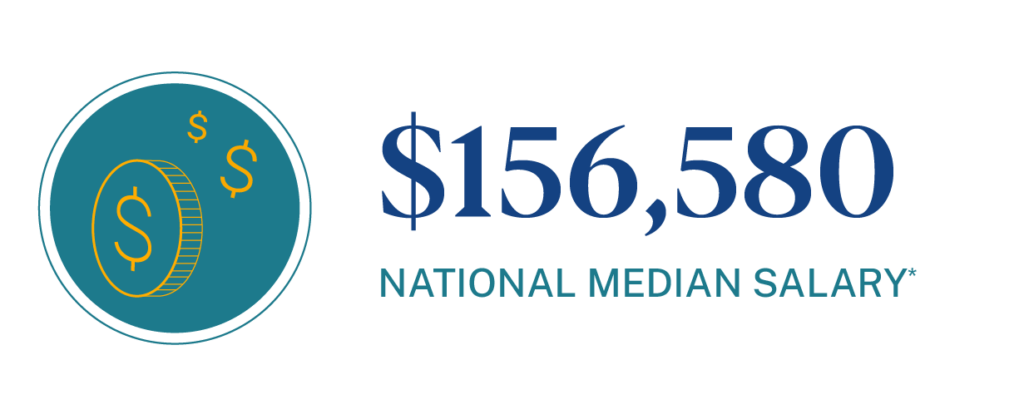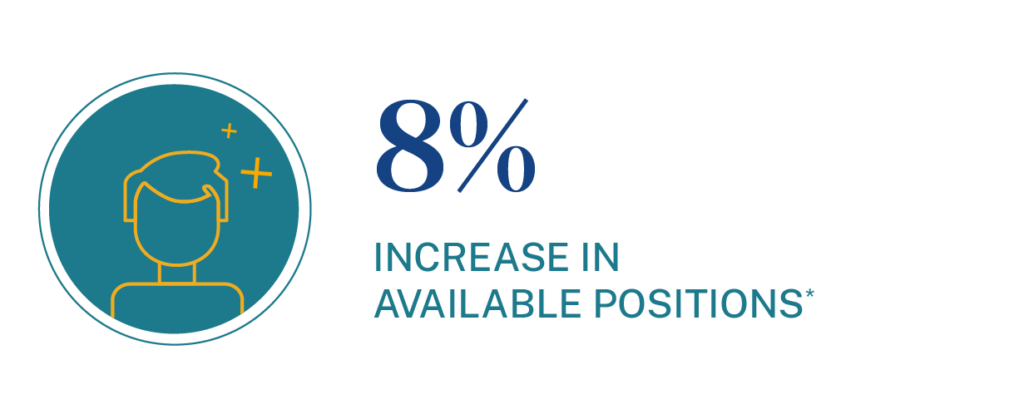Career Guide: Digital Marketer
Here’s what you need to know.
Toggle Navigation
What Is a Digital Marketer?
Whether it’s an engaging blog, a unique web experience or a fun social post, a digital marketer is the behind-the-scenes expert looking to strategize, execute and assess marketing content performance. A digital marketer specializes in the data-driven components of marketing, most of which are designed to generate and convert potential customers into loyal brand ambassadors.
Within digital marketing are a variety of subspecialties such as search engine optimization, paid advertising, social media, website content and more. Each of these areas is unique in its approach, but they are all aiming toward a unified digital marketing and performance goal. Digital marketers usually work either at agencies or within an organization’s marketing department. Some work on a freelance or contract basis.
Today’s technology-first and e-commerce landscape deems digital marketing management as not only desired but critical to meeting profit-based metrics and goals. As artificial intelligence and technology evolve rapidly, digital marketing is a great career choice for an individual who enjoys a fast-paced, cutting-edge work environment where learning and growth never end.
Working in digital marketing also promises high demand and great opportunities to excel into senior and executive-level roles. The United States Bureau of Labor Statistics reports that the field is set to grow 8% from 2023 to 2033,* with approximately 36,600 job openings on the horizon. Plus, digital marketing skills are widely applicable to any business role, regardless of sector.
A career in digital marketing is ideal for an individual who is passionate about expanding brand reach through digital platforms. Additionally, it involves continuous learning and close attention to marketing trends. If this sounds like you, digital marketing could be a great fit. This is your unique guide to a digital marketing career.
What Does a Digital Marketer Do?
Depending on the specific role and sector, a digital marketer has the potential to wear many hats when it comes to responsibilities. Their ultimate goal is to conduct research, create a plan and execute tasks for the entire lifecycle of a digital marketing campaign. At the core, a digital marketer is often responsible for:
- Conducting audience market analyses: Digital marketers are at the forefront when assessing to whom their company – or client if working in an agency – is looking to market. They must identify the audience and its purchase behaviors, demographics, communication preferences and more.
- Developing digital marketing strategies: As key players in the online marketing space, digital marketers are essential in composing research-based and data-driven online marketing strategies that will result in conversion and, ultimately, sales and profits.
- Creating engaging and high-performing content: Digital marketers often delegate creative tasks like copywriting, photography or graphic design to specialists on the marketing team while they serve in a project management role. Other times, digital marketers are also responsible for content creation.
- Monitoring digital campaign performance: The dynamic nature of the internet requires digital marketers to keep a constant eye on whether their online marketing strategies are accomplishing overall marketing goals and performing well.
- Revising approaches based on research: Once areas of performance strength and weakness are identified, a digital marketer leads the charge in adjusting the campaign to better hit goals and reach target audiences.
Various online marketing channels are a significant component of the day-to-day responsibilities in digital marketing. They include but aren’t limited to:
- Search engine optimization (SEO): SEO-friendliness is paramount for a website to succeed in search engines like Google, Bing and Microsoft Edge. Digital marketers are responsible for developing and executing strategies that help customers find a website within search engine markets.
- Paid or digital advertising: Various forms of online display ads targeted at a specific audience encompass paid advertising. Digital marketers manage budgets and aim for the lowest costs possible to reach the desired audience.
- Content: Copywriting, graphic design, videography and photography are all considered content. While a digital marketer may not be responsible for creating it, they often must oversee and direct its development.
- Social media: Digital marketers are often social media managers as well who monitor social media platforms and how a business is engaging with its target audience.
- Email: Whether creating a distribution calendar or determining messaging, a digital marketer is often involved in ensuring email marketing strategies are performing well and converting leads into paying customers.
Digital marketers have the unique opportunity to support business growth in a measurable way. This can look like increasing brand visibility and awareness through SEO practices or creating targeted paid and email marketing strategies that contribute to profitable outcomes. Today’s rapid technology and digital growth are likely to only continue evolving, and this makes digital marketing even more critical for modern businesses and organizations.
How to Become a Digital Marketer
Digital marketing is changing constantly, and keeping up with the latest innovations and technologies means individuals in this field must enjoy continuous learning. There are, however, key fundamental skills that remain more constant and lay a firm foundation. Additionally, the level of education needed often depends on your career goals.
Education Pathways
Education is critical for becoming a standout candidate in digital marketing, and there are various ways to gain the skills you need.
Degrees
With digital marketing being such a multifaceted field, you have the unique opportunity to choose from various business-related bachelor’s degrees that will equip you for a digital marketing career. Examples include marketing, business, communications and more.
If you want to advance into a leadership role, you’ll want to consider a master’s degree. Many marketing professionals pursue a Master of Business Administration (MBA) program, but you can complete other degrees within business or communications as well.
Certifications
Whether you decide to earn a degree or not, keeping your skills sharp or developing knowledge in particular areas can advance your career and ensure you’re adept with new developments and technologies. Many well-known companies like Google, HubSpot, Meta and LinkedIn offer standalone courses or full-length certification programs. Some certifications, like those found at universities or colleges, are designed for more experienced marketers.
Self-Learning
Some digital marketers are self-taught through blogs, YouTube channels and side projects where they learn from industry experts and practical experience. This option is feasible to launch a career, but candidates with a formal degree may have more job opportunities.
Essential Skills
Digital marketers need a set of essential skills to put their best foot forward. No matter what education pathway works for you, these skills will undoubtedly come up.
- SEO
- Google ads
- Social media management
- Data analytics
- Email marketing
- Content creation
- Communication
- Strategy
Practical Experience
Education becomes more powerful when paired with hands-on experience. Much like education, there’s a wide range of ways to get digital marketing experience on your resume.
- Freelancing: A freelance position is a self-employed role where you offer digital marketing services on a contract or project basis. You have the autonomy to set your own rates, choose clients and create work hours. This is also a great way to understand how agency digital marketing works.
- Internships: An internship in digital marketing is an introductory opportunity to build essential, foundational skills under the supervision or mentorship of a more seasoned digital marketing professional. This type of hands-on experience allows you to learn by doing and ask questions as they arise.
- Side projects: Since there are so many digital marketing channels, there are countless opportunities to practice skills on your own. You can create and write a blog, manage a social media account for a small business, build a website, design flyers for a local event, and more. These opportunities make for strong starting points to a meaningful digital marketing career.
Positions and Career Growth in Digital Marketing
Many digital marketing career paths often fall into two buckets – generalist and specialist. A generalist will wear many hats and have skills in most, if not all, of the many facets of the field. On the other hand, a specialist is focused on mastering one or two components. Either pathway has opportunities for career growth into leadership and senior digital marketing roles.
Entry-Level Positions
Entry-level roles are where you’ll get your feet wet and gain practical experience in the foundational skills you learned in either a bachelor’s degree program or a certification. Some examples include:
- Content marketing specialist
- SEO specialist
- Social media coordinator
- Email marketing specialist
- Digital ads assistant
- Data analyst
- Digital marketing specialist
Mid-Level Positions
After a few years or more in an entry-level role, you’ll have the experience needed for a mid-level position. Sometimes, these roles will require or prefer a master’s degree in business or a related field. Some examples include:
- Content marketing manager
- SEO manager
- Social media manager
- Email marketing manager
- Digital ads executive
- Data analyst
- Digital marketing manager
Senior-Level Positions
Achieving a senior-level position requires more experience, often seven to 10 years, and is more likely to require a master’s degree in business or a related field. Additionally, you’ll often need leadership experience that you ideally gained in a mid-level position. Some examples include:
- Senior content marketing manager, content marketing lead, director of content marketing
- Senior SEO manager, growth marketing lead
- Senior social media manager, social media lead, director of social media
- Senior email marketing manager, director of email marketing
- Senior digital ads manager, director of digital advertising, vice president of digital advertising
- Senior data analytics manager
- Senior digital marketing manager, digital marketing director
Executive Positions
The highest level of a digital marketing career will be the executive level. These marketers have proven track records of success and gained 10 or more years of experience. A master’s degree is generally required, and sometimes a terminal degree is preferred. Some examples include:
- Chief marketing officer
- Chief data officer
- Head of growth marketing
- Head of digital marketing
Freelance Positions
Freelance positions are led by you, so you can be at any level of your career. Sometimes freelance work becomes a full-time job, and other times, it makes for a great side project if you have a day-to-day role at an organization, business or agency.
Degree Options for Digital Marketing
Advance Your Marketing Career
The next level of your career is ready when you are. All you have to do is apply now!


